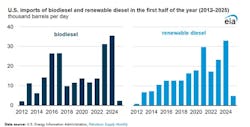US imports of biodiesel, renewable diesel decline sharply in first-half 2025
US imports of biodiesel and renewable diesel plunged in first-half 2025 to their lowest levels in more than a decade, following the loss of tax credits for imported biofuels and a general decline in domestic consumption of these fuels, according to the US Energy Information Administration (EIA).
Renewable diesel and biodiesel are biomass-based diesel fuels that can replace petroleum-based distillates and meet the blending requirements of the Renewable Fuel Standard (RFS) administered by the US Environmental Protection Agency (EPA).
Biodiesel imports averaged just 2,000 b/d between January and June, down sharply from 35,000 b/d during the same period last year. Renewable diesel imports fell to 5,000 b/d, compared with 33,000 b/d in first-half 2024. EIA said these imports are now at their lowest point since 2012, when US biodiesel consumption was less than half of its 2024 level and renewable diesel consumption was negligible.
“One key reason for the sharp drop in biodiesel and renewable diesel imports in early 2025 is the loss in tax credits for imported biofuels. Before 2025, both imported and domestically produced biodiesel and renewable diesel received a $1/gal blender’s tax credit (BTC). The Inflation Reduction Act replaced the BTC with the Section 45Z Clean Fuel Production Credit in 2025, which only applies to domestic production. This tax credit changes placed imports at a relative economic disadvantage,” said Jimmy Troderman, an economist at EIA.
A second reason for the decline in biodiesel and renewable diesel imports in first-half 2025 is lower US consumption of these fuels due to uncertainty about blending requirements and negative profit margins for blended biofuels.
“Compared with first-half 2024, US consumption of renewable diesel was down about 30% in first-half 2025, and biodiesel consumption was down about 40%. This lower consumption reduced demand for both imported and domestically produced biofuels,” Troderman continued.
Due to low blending margins and the relative economic disadvantage of imported biofuels, domestic blenders are forced to rely on domestically produced biofuels when blending volumes are low. As a result, international biofuel producers are finding it less profitable to ship their products to the US. For example, Neste, the producer of all of the renewable diesel imported to the US, reported a lower share of exports going to the US in first-half 2025 than in first-half 2024.
Looking ahead, EIA expects US consumption of biodiesel and renewable diesel to increase as the year progresses to meet existing RFS mandates, but imports of the fuels will likely remain low because of the change in tax policy.
